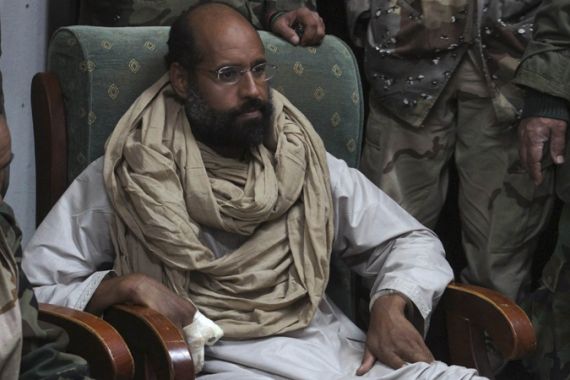Libya ‘sets trial date’ for Gaddafi’s son
Saif al-Islam will go on trial next month in Libyan town of Zintan, prosecution official says, despite an ICC warrant.

Prosecution officials in Libya have set a September trial date for Saif al-Islam, the son of deposed leader Muammar Gaddafi, defying repeated calls from the International Criminal Court (ICC) to try him at The Hague.
|
“Zintan is a Libyan city and the law allows us to try Saif in the majority of Libyan cities, in that these crimes concern the whole country“ – Taha Nasser Baara, |
“A committee from the prosecutor general’s office has completed its investigation into the crimes committed by Saif al-Islam from the start of the revolution on February 15 [2011] and has prepared the chargesheet,” prosecutor general spokesperson Taha Nasser Baara said on Thursday.
He said the chargesheet would be “approved by the prosecutor general in the coming days and a date set for the September trial opening” in Zintan, a hilltop town 170km southwest of the capital.
The press has speculated that the location of the trial may be the outcome of negotiations between justice officials and a militia comprising former rebels who arrested Saif and demanded that he be tried in Zintan.
But these claims were instantly dismissed.
“Zintan is a Libyan city and the law allows us to try Saif in the majority of Libyan cities, in that these crimes concern the whole country,” Baraa said.
He added that “cities far from the capital are more secure”.
‘Sufficient evidence’
Saif, the second son of Gaddafi is wanted by the ICC on charges of crimes against humanity but has since been held in a secret prison in the custody of the Zintan fighters who captured him.
On July 31 his lawyers issued a statement claiming their client was pleading to be put on trial before The Hague-based court for justice to be served.
But the new Libyan authorities have maintained that he should stand trial in his home country.
“During investigations, there was no intervention by the ICC,” said Baraa, adding that the prosecutor general had “solid proof in the form of sound recordings, images, documents and testimony”.
“We believe that this evidence is sufficient to condemn and judge him,” the Libyan official said.
ICC officials declined to comment on the decision saying the court had not been notified of it, insisting that ICC proceedings against Saif were still ongoing.
Human rights groups have raised concerns that the 40-year-old could face the death penalty if tried in Libya.